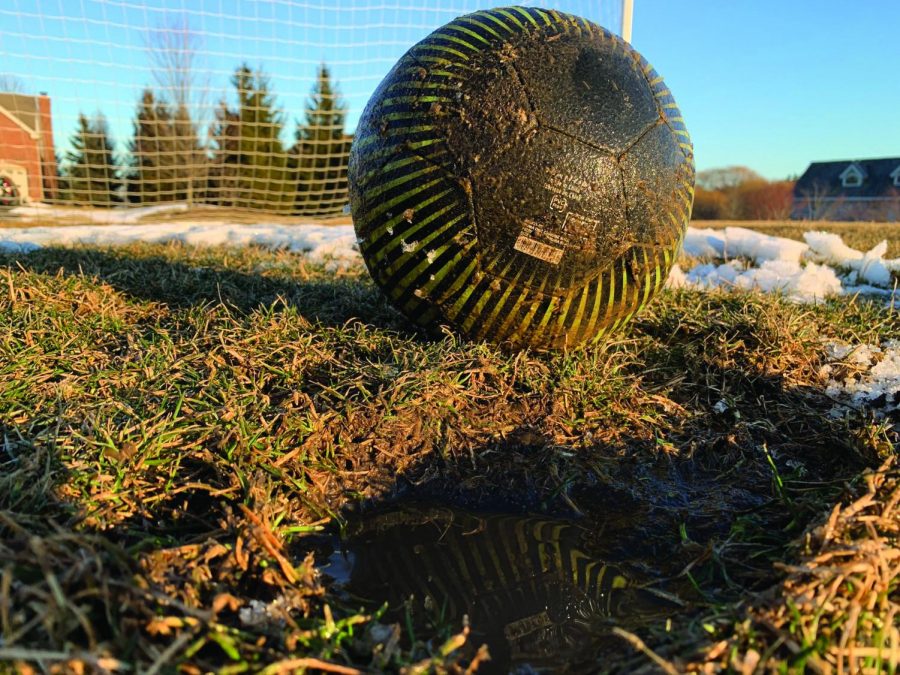In Rain or Shine
Athletes adapt to weather in spring season
Photo by Sophia Babcock
With rain the field becomes wet and muddy. Athletes must adapt to the conditions.
With unpredictable weather during the spring, athletes have to adapt to playing in many different conditions. According to the coaches, the reduction of fields due to construction at May Whitney does not have a significant impact on the spring season overall, however, the gamble lies within the weather.
With limited spacing this year the coaches have found ways to “maximize the space we have,” Michael Castronova, varsity girls soccer coach, said. The department intends on keeping things the same as they were in the fall although they are hoping for better weather, according to Castranova.
“Whether it’s super hot, or super cold, your muscles are gonna feel different. You’re gonna be playing a little bit different,” Lindsay Puppolo, guidance counselor and freshman girls soccer coach, said. “The wind is a factor depending on what side you’re on and the time of day. If the sun is setting and it’s right in your face, that’s going to be a factor as well. Some players are really strong when it’s cold, [and] some players do much better when it’s hot. I think everyone’s a little different. You just have to play to your strengths.”
Not only does the weather impact the schedule, but it impacts the condition of the fields. This puts athletes at risk for injuries, and impacts their ability to practice and play at their best level, according to Jackie Gallo, sophomore soccer player. “If you play on a wet field, when you step into a tackle for the ball or [to take a shot], you can slip and hurt your ankle or knee,” Gallo said.
“The quality of the field makes a difference in the game because when you play on a muddy or wet field with long grass it [can throw you off],” Gallo said. “When [playing on] turf the game moves much faster and allows for you to make more accurate passes, which [makes] a major difference in the game. You are able to play your sport better and more effectively. When you play in bad conditions your ability to play soccer is harder because the ball is constantly stopping and you can’t show what you are fully capable of.”
The May Whitney fields were on higher ground compared to the fields in the back of the school. If the season turns out to be rainy, water will naturally flow into the lower fields making the conditions difficult to play on. However, playing on the grass fields can benefit athletes according to Mike Sutton, head lacrosse coach.
“[The team] practices on grass and in some aspects that can make you better. [For example], picking up a ground ball on grass is way more difficult than picking up on the turf. So, if you can master it in the grass, it should be rather easy on the turf. Same thing [with] speed. Running in the mud or dirt is not ideal, and it can be like heavier on your feet so when you switch to turf, [speed comes easier],” Sutton said.
Even though things can get a little muddy sometimes, it is important to train on the field that you’re going to be competing on according to Puppolo.
“I think it’s good for my team specifically to be practicing on grass because we play [on] grass. If we are practicing on turf and playing on grass it’s hard because they’re different, so it’s good to have practice on the same exact field that you’re going to be playing games on,” Puppolo said.
It can be “frustrating” when games and practices are canceled due to weather, according to Puppolo. She wants her players to have as many games as possible, but understands that weather is a part of the game. “[Weather] definitely [plays] a part in the mental state of the game,” Puppolo said. Athletes have to be “mentally tough” when playing in difficult weather, according to Puppolo.
“You want to try to have the best field conditions that you can for the players. I think that’s the most important thing for the safety of the players. It’s spring sports, I think we’re kind of used to [questionable weather],” Castranova said.

Sophia Babcock is a senior and this is her third year on staff and fourth year in the journalism program. This year she is excited to take on the role...

